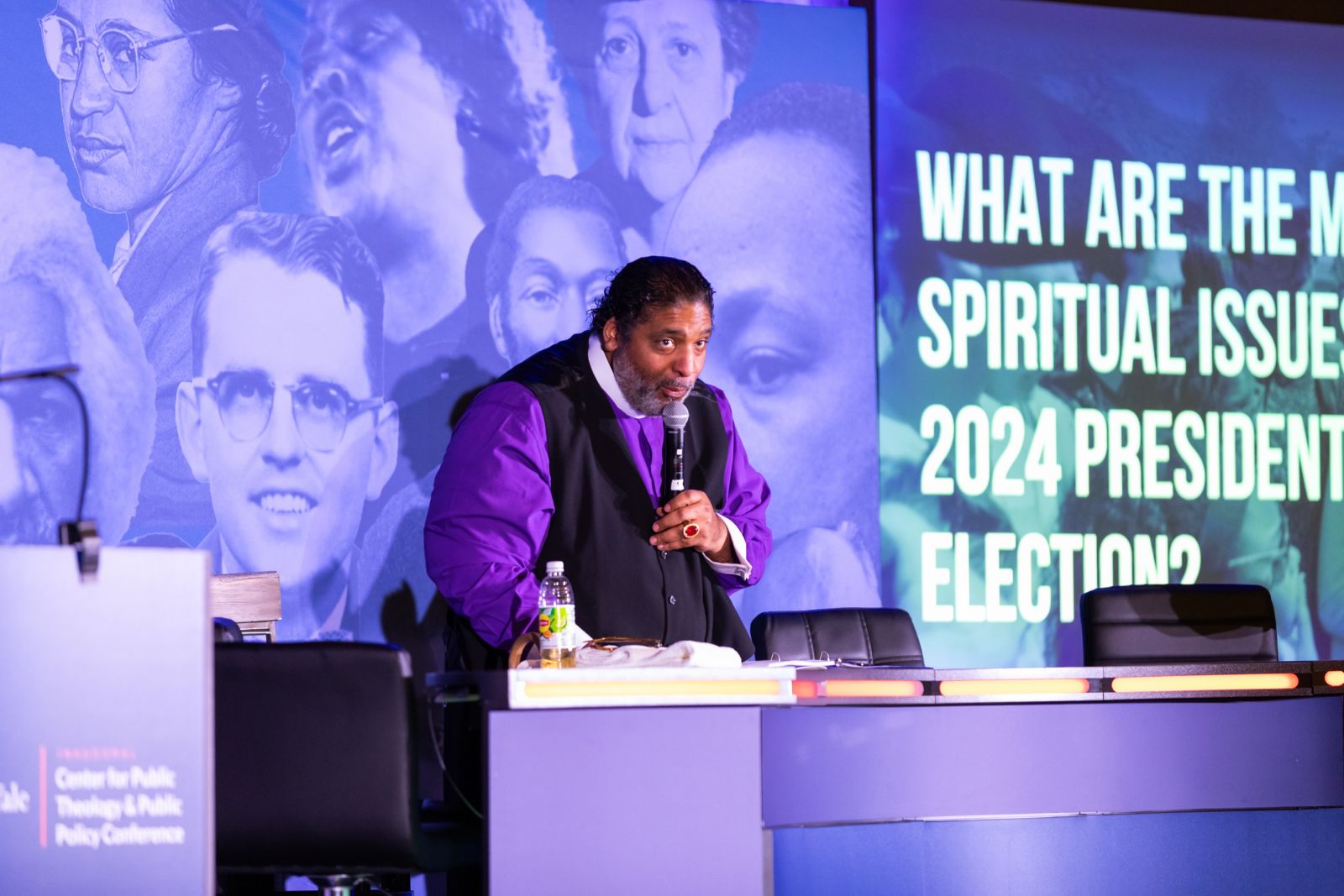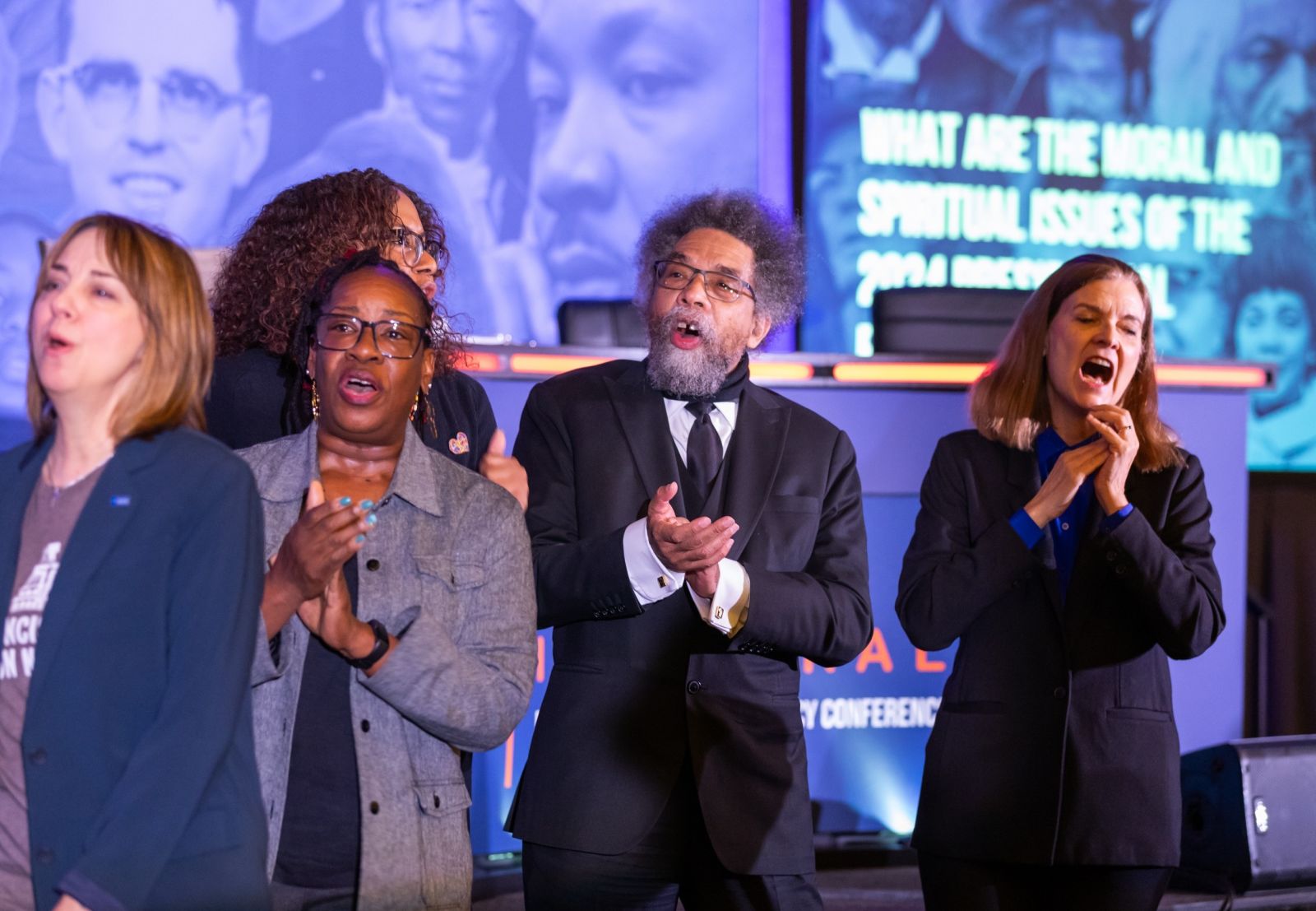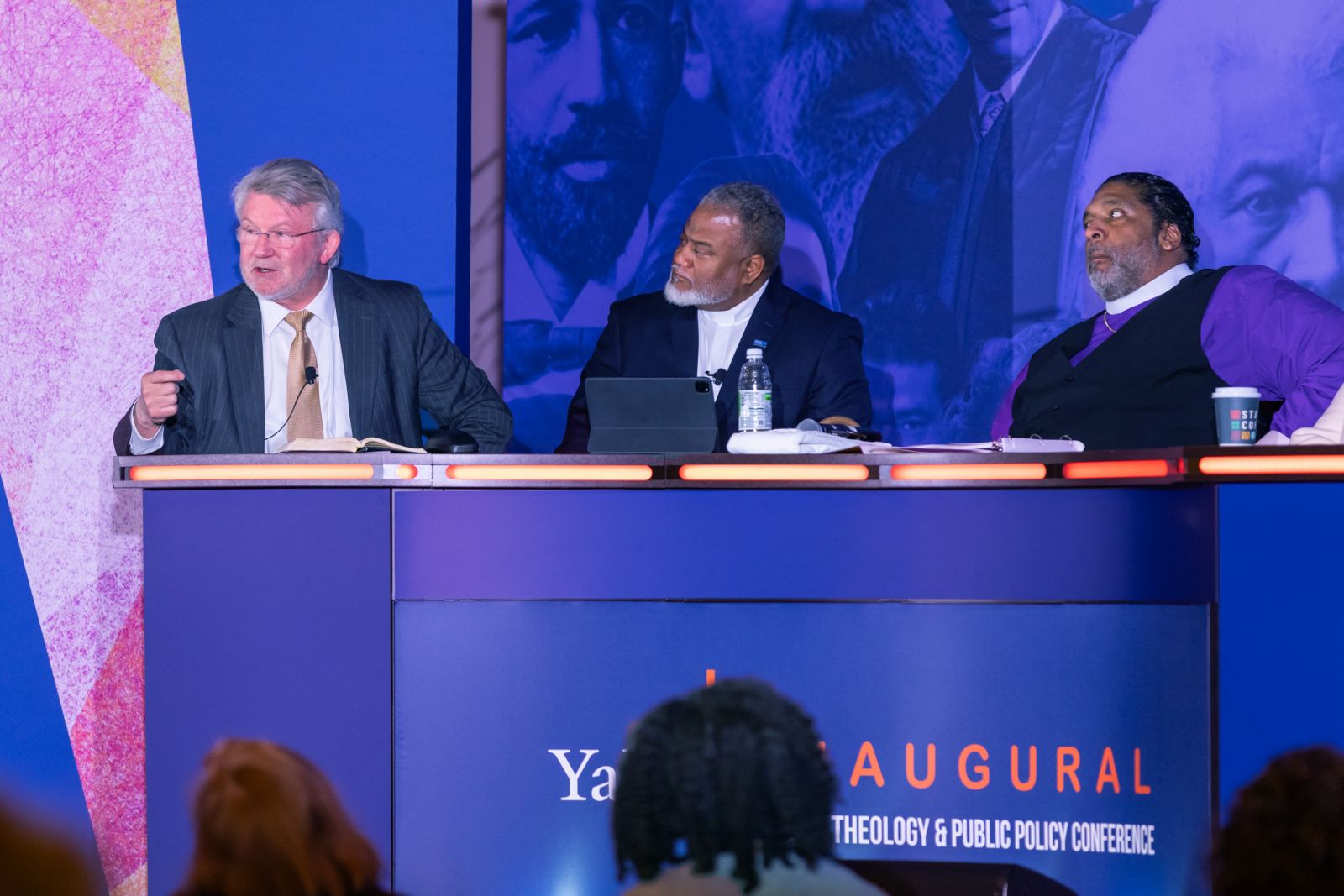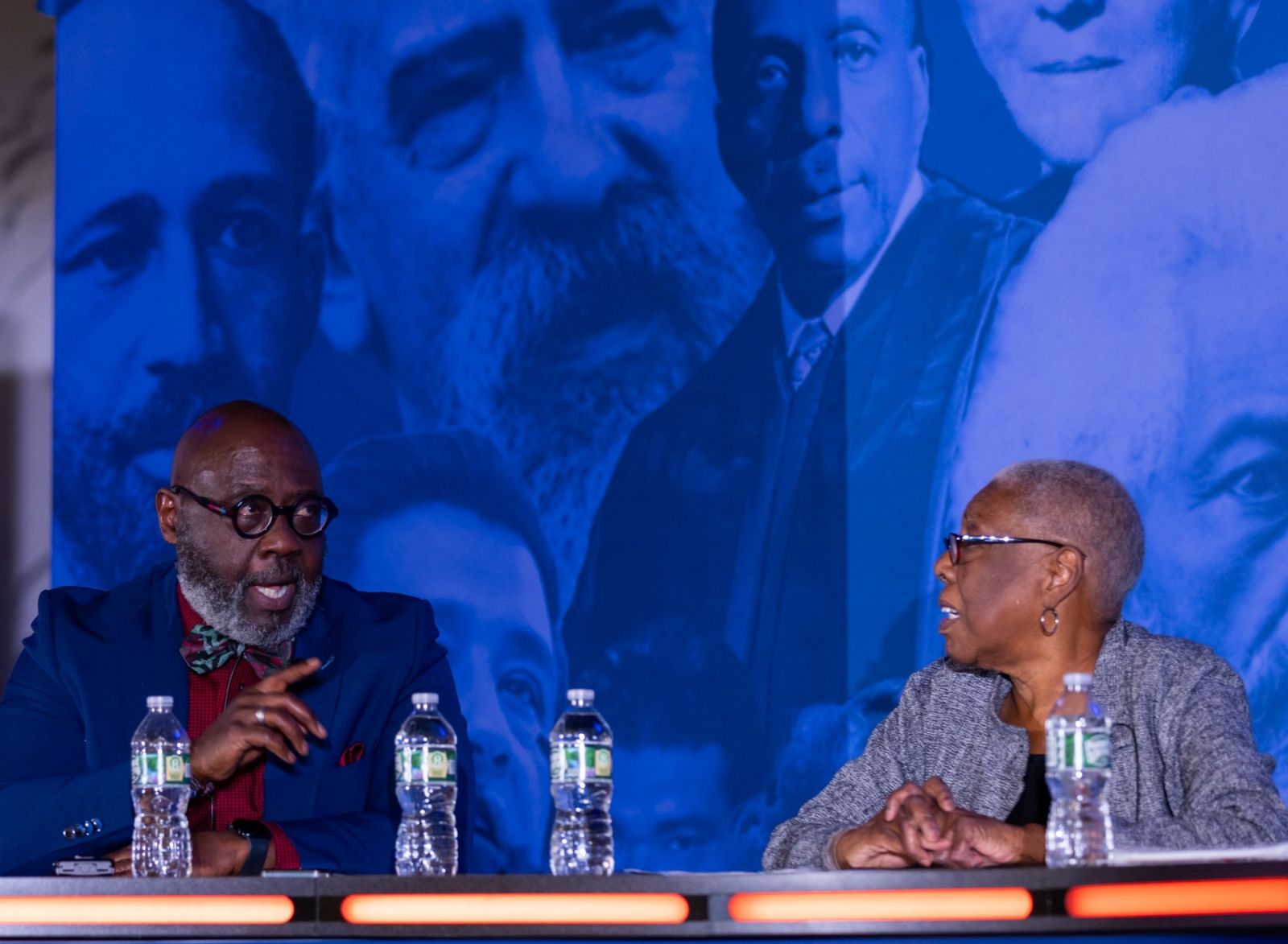By Lauren Yanks '19 M.Div.
Ministers, theologians, scholars, and activists gathered in New Haven April 7-9 for the inaugural conference of the Center for Public Theology & Public Policy at YDS. Organized by the center’s director, Bishop William Barber II, and its staff, the conference focused on the moral and spiritual issues of the forthcoming 2024 presidential election and challenged religious leaders to preach on moral issues and reject the divisive tactics of Christian nationalism.
“We have to get loud when saying ‘no’ to those who teach that real faith is being against gay people and being for tax cuts,” Barber declared. “A political movement has co-opted our faith tradition, but Jesus already told us what he stands for: giving good news to the poor and healing the sick and brokenhearted.”
 Elaborating in an interview, Barber said, “There are no left or right Christians. Instead, there are 2,000 scriptures about living in relationship to the disinherited and disenfranchised. Our ultimate goal is for all of us to break free of narrow confines and find our deepest moral values, rooted both in Scripture as well as America’s founding documents.”
Elaborating in an interview, Barber said, “There are no left or right Christians. Instead, there are 2,000 scriptures about living in relationship to the disinherited and disenfranchised. Our ultimate goal is for all of us to break free of narrow confines and find our deepest moral values, rooted both in Scripture as well as America’s founding documents.”
Panels, film, and a final declaration
The unique conference opened each day with gospel music before hosting back-to-back panels on issues of poverty, healthcare, voting rights, social justice, and the role of public theology. Each panel featured a mix of theologians, policy experts, and on-the-ground activists. As they spoke, images of public theologians like Howard Thurman, Abraham Joshua Heschel, and Fannie Lou Hamer hung on the stage’s backdrop, providing greater context, hope, and resilience.
“The faces of these public theologians from the past remind us that this work has never been easy, and none of it is new,” Barber said. “Moses had Pharoah. Jesus had Caesar. Slavery had the slave masters. But as it says in Isaiah: ‘Lift your voice like a trumpet in the public square!’ That’s what we must do. We have been too quiet.”
One of the panels, “Low Wages and Union Rights Are Moral Issues in 2024,” touched upon the millions of poor and low-wage Americans struggling to survive. Pam Garrison, a panelist and organizer of the West Virginia chapter of the Poor People’s Campaign, spoke passionately about the dissolution of unions and the struggles of today’s miners.
“I was raised a coalminer’s daughter,” she said proudly. “Before they broke the unions, the workers had full health insurance and paid vacation. Today, we’ve got men—boys—going into mines for $15 an hour with no safety net, no vacation. My daddy and my grandparents would be turning over in their graves if they saw what was going on in West Virginia. We’re just trying to survive.”
Another panel, “Healthcare and Ecological Justice Are Moral Issues in 2024,” included Dr. Wendsler Nosie Sr., founder and leader of a group called Apache Stronghold that advocates for Indigenous religious and human rights. He opened with a heartfelt prayer to the creator in his native tongue.
“We’re all intertwined with Mother Earth,” he said. “But the U.S. is disregarding everything that gives life to the earth. That’s what brings me to this discussion that Rev. Barber is starting. We have to be at the table with you all because we’re all in this together.”
 After examining the destruction of natural resources, the panel discussed the recent pandemic and whether society has properly examined the inequities exposed by the public health emergency.
After examining the destruction of natural resources, the panel discussed the recent pandemic and whether society has properly examined the inequities exposed by the public health emergency.
Dr. Sharrelle Barber, a scholar-activist, addressed these consequences. As a social epidemiologist at Drexel University’s Ubuntu Center, she focuses on the effects of social-structural factors on states of health. According to the National Institutes of Health, social epidemiology assumes that the distribution of advantages and disadvantages in a society reflects the distribution of health and disease.
“We coined this term essential workers, but they really were disposable,” she said. “We sent them to the frontlines of this pandemic with no protection, no health insurance, and we expected them to survive." Barber added she knows of a man who was a hospital custodial worker. "He was a low-wage, essential worker, and part of his job description became to help bag the bodies. We must ask: Have we honored the workers who literally put their lives on the line?”
As the conference delved deeper into the moral issues of the day, concern about Christian nationalism and its anti-democratic agenda continued to buzz. It reached its zenith with an evening screening of “Bad Faith,” a film by documentarian Stephen Ujlaki.
“It’s important to see the film because it provides strength and clarity about this dangerous anti-democratic force,” said Ujlaki, who spoke at the screening. “This conference is a step in the right direction because many religious leaders are dealing with congregations that are confused. This will enable them to become more effective.”
 At the end of a jam-packed two days, the conference closed with the rollout of the “New Haven Declaration of Moral & Spiritual Issues in the 2024 Presidential Election.” The Declaration challenged religious leaders to “launch a season of preaching the moral issues of living wages and union rights” and warning against a religious nationalism that “has persuaded many well-meaning Christians to focus on a narrow set of divisive culture wedge issues.” The excitement in the room was palpable as attendees signed the Declaration and talked about their plans to pass it on while gospel music played in the background.
At the end of a jam-packed two days, the conference closed with the rollout of the “New Haven Declaration of Moral & Spiritual Issues in the 2024 Presidential Election.” The Declaration challenged religious leaders to “launch a season of preaching the moral issues of living wages and union rights” and warning against a religious nationalism that “has persuaded many well-meaning Christians to focus on a narrow set of divisive culture wedge issues.” The excitement in the room was palpable as attendees signed the Declaration and talked about their plans to pass it on while gospel music played in the background.
At Yale, Christian pastors sign a declaration opposing religious nationalism: Read the Religion News Service story.
Two of the Declaration’s first signers—both of them conference panelists—were Greg Sterling, YDS Dean and Lillian Claus Professor of New Testament, and Willie James Jennings, YDS Associate Professor of Systematic Theology and Africana Studies. Both were instrumental in collaborating with Barber to establish the public theology center at YDS.
A trailblazing center is born
The seeds of the Center for Public Theology & Public Policy were planted when Barber shared with his old friend Jennings his dream of bringing together the policy and theology of the academy with movement-building and public ministry.
“Rev. Barber was looking for a place to bring together religious leaders, politicians, activists, scholars, lawyers, and others to think about the needs of the world while training the next generation of leaders,” Jennings said. “With his vast wisdom and experience, I thought it would be good to do it at Yale.”
When Jennings approached Sterling about it, the Dean immediately agreed.
“As a Christian divinity school, we have a certain commitment to a standard of morals and ethical vision,” Sterling said. “And I believe that Barber is our country’s leading voice for this vision.”
Through two years of negotiating and planning, Sterling’s resolve never faltered. Since his arrival at YDS in 2012, he has become an important and outspoken voice in his own right for social justice. After the events of January 6, he wrote about moral values in an opinion piece for CNN, “Capital Rioters Made a Mockery of Christian Values.”
“As someone who has devoted his entire life to understanding, exploring, and teaching the truth about Christianity, I saw the use of Christian symbols and rhetoric as part of the violent assault on the U.S. Capitol as a desecration of democracy’s chapel and a blaspheme of my faith,” he wrote.
Sterling believes the Center for Public Theology & Public Policy will help amplify Christian morality, especially at the grassroots level.
“I think that the major issues we face will be changed from the bottom up,” he said.
“We need to awaken people’s consciousness and get them to support the moral principles in which so many of us believe.”
Jennings sees the Center influencing not only the Divinity School but the whole university.
 “The mission of Yale is not only about people who show excellence in their fields, but how that excellence is guided by the common good,” he said. “Students in law, public policy, philosophy, medicine, and management can gather together to think about poverty and the political use of religion in nefarious ways. It creates conversations that are desperately needed and about training the next generation to do their work with a moral compass.”
“The mission of Yale is not only about people who show excellence in their fields, but how that excellence is guided by the common good,” he said. “Students in law, public policy, philosophy, medicine, and management can gather together to think about poverty and the political use of religion in nefarious ways. It creates conversations that are desperately needed and about training the next generation to do their work with a moral compass.”
Since arriving at Yale in January 2023, an already-busy Rev. Barber has been even busier. He continues to teach, travel, lobby, advocate, and reach out to those who are often forgotten by mainstream politics and media. When asked what keeps him going, he remembers a visit to a homeless camp many years ago.
“When I arrived, I saw people of all colors and ages, including children,” he said. “A lady jumped out of her seat and sat me down. They offered me their food and told me their stories. When I asked what they wanted from me, they said, ‘When you leave here, don’t forget us.’ Their capacity for love in such difficult circumstances gave me hope.”
As he reflected upon this story, Barber was reminded of Scripture in Amos that says, “All I need is a remnant.”
“In movements of the past, it was never the large majority that made it better for everybody,” he said. “Instead, it was always a committed remnant who never lost their love of people and their faith in transformational justice. Hope in the divine kept them moving forward, despite the obstacles. We’ve just got to keep moving forward by speaking out against evil and sharing our deepest moral values. That’s what I hope people took away from our conference and what our Center stands for. We must love and care for each other, especially to those most in need—to the least of these.”
Lauren Yanks ‘19 M.Div. is a writer and professor and Executive Director of the Blue Butterfly Foundation, a nonprofit organization that helps educate women and children who have been trafficked and enslaved.